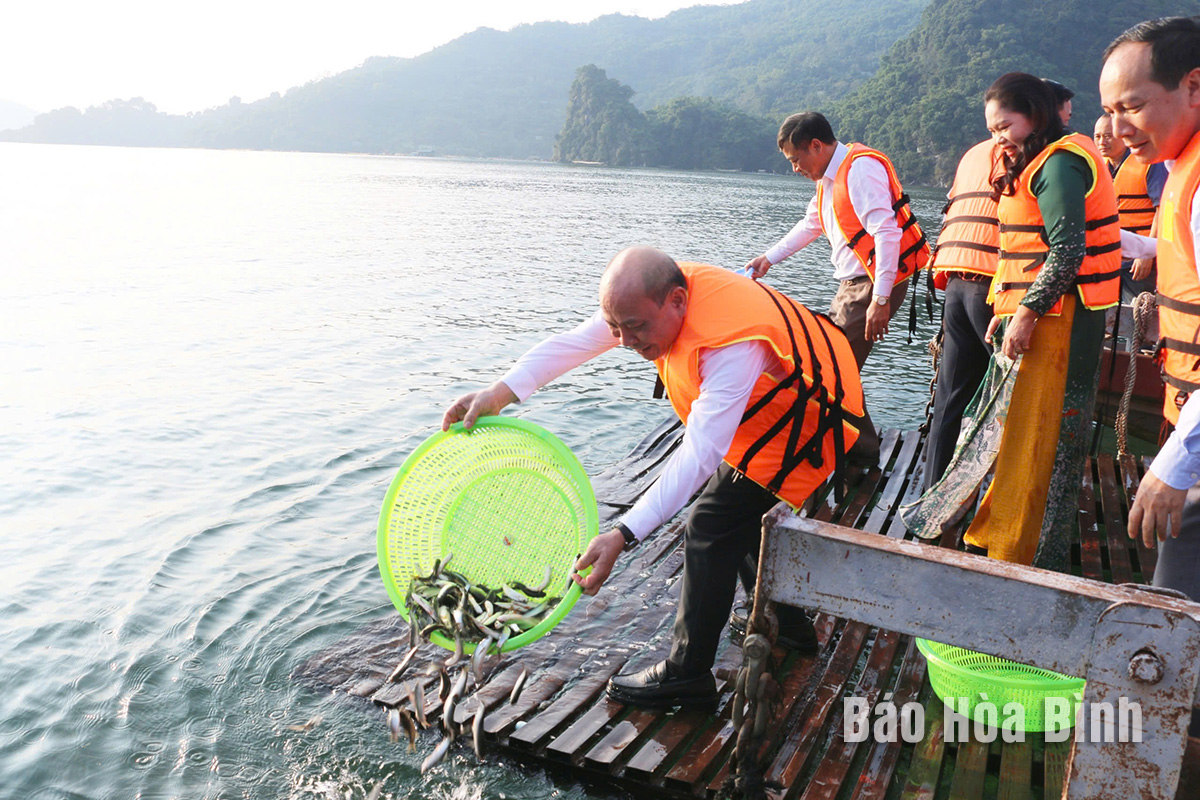
The provincial Department of Agriculture and Rural Development on November 20 coordinated with Hai Dang Group Hoa Binh Seafood Company Limited to release 1.5 tonnes of fries into Hoa Binh Lake to regenerate aquatic resources, with a total value of 266 million VND (10,460 USD).
This, an activity within the framework of
the second Da River Fish and Shrimp Festival in Hoa Binh province, saw the
presence of Bui Duc Hinh, Standing Deputy Secretary of the provincial Party
Committee, Chairman of the provincial People's Council; and Dinh Cong Su, Vice
Chairman of the provincial People's Committee.

Bui Duc Hinh, Standing Deputy Secretary of the provincial Party Committee, Chairman of the provincial People's Council, and leaders of several departments and sectors release fries into Hoa Binh Lake.
The Da River flows through Hoa Binh
province with an area of about 8,900 hectares, belonging to 19 communes of Da
Bac, Mai Chau, Cao Phong and Tan Lac districts, and Hoa Binh city. Hoa Binh
Lake is considered a valuable treasure of organisms and aquatic resources of
the province. However, in recent years, fishing, especially destructive fishing
methods, has depleted aquatic resources in the lake.
Therefore, every year, the agricultural
sector has mobilised many resources to protect, regenerate and develop aquatic
resources in Hoa Binh Lake. The activity aims to help organisations and
individuals understand the importance and responsibility of protecting aquatic
resources, implementing aquaculture and exploitation in association with
environmental protection, and strictly prohibiting the use of explosives, toxic
substances and electric shocks to exploit aquatic resources. This contributes
to the regeneration and restoration of resources, and diversification of
aquatic species in the waters of Hoa Binh Lake.
Since the beginning of this year, under the direction of the Department of Agriculture and Environment, the Sub-Department of Agricultural, Forestry, and Fishery Product Quality Management has strengthened the integration of the professional activities to promote and guide the organizations and individuals in the production and trading of agricultural, forestry, and fishery products to comply with the legal regulations regarding the use of chemicals, pesticides and veterinary medicines in crop cultivation, livestock farming and aquaculture. They also provide guidance to processing and manufacturing establishments on keeping the records to trace the product origins and using food additives from the approved list according to the regulations.
Hoa Binh province saw a significant rise in state budget revenue in the first two months of 2025, heard a meeting chaired by Vice Chairman of the provincial People’s Committee Quach Tat Liem.
Ha Thi Ha Chi, a 26-year-old graduate in law, has taken an unconventional path by returning to her hometown in Mai Chau district to establish the Tong Dau Cooperative, creating stable jobs for local women and bringing Thai ethnic brocade weaving to the global market.
As the Lunar New Year 2025 approached, pork prices surged, creating a profitable season for farmers in Tan Vinh commune, Luong Son district. Taking advantage of the rising demand, Can Minh Son, a farmer from Coi hamlet, sold over 30 pigs at 69,000 VND/kg, each weighing more than 100 kg. After deducting expenses, his family earned a profit of over 50 million VND.
alternate member of the Central Party Committee, Secretary of the Hoa Binh provincial Party Committee Nguyen Phi Long on March 5 had a working session with Yan Jiehe, Founder and Chairman of the China Pacific Construction Group, one of China's largest private corporations in the field of transport infrastructure. Deputy Secretary of the provincial Party Committee, Chairman of the provincial People's Committee Bui Duc Hinh and leaders of provincial departments and sectors also attended the working session.
The electronic printed circuit board (PCB) manufacturing and processing plant of Japan’s Meiko Group, located at Da River Left Bank Industrial Park in Hoa Binh city with a total investment of over 200 million USD, is expected to create thousands of jobs and make a significant contribution to the local budget.



